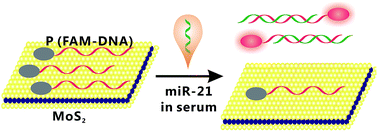当前位置:
X-MOL 学术
›
Anal. Methods
›
论文详情
Our official English website, www.x-mol.net, welcomes your
feedback! (Note: you will need to create a separate account there.)
MoS2-based sensor for the detection of miRNA in serum samples related to breast cancer†
Analytical Methods ( IF 2.7 ) Pub Date : 2017-12-04 00:00:00 , DOI: 10.1039/c7ay02329d Bingjie Cai 1, 2, 3, 4 , Shuang Guo 2, 3, 4, 5 , Yan Li 1, 2, 3, 4
Analytical Methods ( IF 2.7 ) Pub Date : 2017-12-04 00:00:00 , DOI: 10.1039/c7ay02329d Bingjie Cai 1, 2, 3, 4 , Shuang Guo 2, 3, 4, 5 , Yan Li 1, 2, 3, 4
Affiliation

|
Early diagnosis of cancer is critical for the treatment of patients, and can reduce the risk of death. Breast cancer is one of the most common malignant tumors in women, and miR-21, as an important breast cancer biomarker, can be helpful for the early diagnosis of breast cancer. In this work, we have developed an efficient, sensitive and specific fluorescence sensor based on the novel nanomaterial molybdenum disulfide (MoS2) to detect miR-21. The novel nanomaterial MoS2 was introduced to a fluorescent dye-labeled DNA probe to fabricate the fluorescence sensor, and then non-complementary miRNA, one-base mismatched miRNA and complementary miR-21 were separately introduced to the sensor to hybridize with the DNA probe. By monitoring the change of the fluorescence signal before and after DNA-miRNA hybridization, miR-21 could be detected. We found that the sensor could discriminate complementary miR-21 from one-base mismatched miRNA and non-complementary miRNA successfully. Furthermore, the biosensor was able to detect miR-21 down to a concentration of 500 pM, and the detection could be completed in only 40 min. The novel MoS2 fluorescence sensor, with the advantages of fast analysis, high sensitivity and specificity, and low cost, is suitable for miR-21 detection which is of great importance for the early diagnosis of breast cancer. What’s more, the novel sensor, with high sensitivity and selectivity, was also used to detect miR-21 in serum samples, making it a promising method for detection in real samples from patients with cancer. Thus the novel MoS2 fluorescence sensor shows huge potential for early diagnosis of cancer.
中文翻译:

基于 MoS 2的传感器,用于检测与乳腺癌有关的血清样品中的miRNA †
癌症的早期诊断对于患者的治疗至关重要,并且可以降低死亡风险。乳腺癌是女性中最常见的恶性肿瘤之一,miR-21作为重要的乳腺癌生物标志物,可有助于乳腺癌的早期诊断。在这项工作中,我们已经开发了一种基于新型纳米材料二硫化钼(MoS 2)的高效,灵敏和特异的荧光传感器,可以检测miR-21。新型纳米材料MoS 2将其引入荧光染料标记的DNA探针以制造荧光传感器,然后将非互补的miRNA,一碱基错配的miRNA和互补的miR-21分别引入传感器以与DNA探针杂交。通过监测DNA-miRNA杂交前后荧光信号的变化,可以检测到miR-21。我们发现该传感器可以成功地将互补miR-21与一碱基错配的miRNA和非互补的miRNA区分开。此外,该生物传感器能够检测低至500 pM浓度的miR-21,并且仅需40分钟即可完成检测。小说MoS 2荧光传感器具有分析速度快,灵敏度高,特异性强,成本低等优点,适用于miR-21检测,对乳腺癌的早期诊断具有重要意义。此外,这种新型传感器具有高灵敏度和选择性,还用于检测血清样品中的miR-21,使其成为从癌症患者的真实样品中检测的有前途的方法。因此,新型的MoS 2荧光传感器在癌症的早期诊断中显示出巨大的潜力。
更新日期:2017-12-04
中文翻译:

基于 MoS 2的传感器,用于检测与乳腺癌有关的血清样品中的miRNA †
癌症的早期诊断对于患者的治疗至关重要,并且可以降低死亡风险。乳腺癌是女性中最常见的恶性肿瘤之一,miR-21作为重要的乳腺癌生物标志物,可有助于乳腺癌的早期诊断。在这项工作中,我们已经开发了一种基于新型纳米材料二硫化钼(MoS 2)的高效,灵敏和特异的荧光传感器,可以检测miR-21。新型纳米材料MoS 2将其引入荧光染料标记的DNA探针以制造荧光传感器,然后将非互补的miRNA,一碱基错配的miRNA和互补的miR-21分别引入传感器以与DNA探针杂交。通过监测DNA-miRNA杂交前后荧光信号的变化,可以检测到miR-21。我们发现该传感器可以成功地将互补miR-21与一碱基错配的miRNA和非互补的miRNA区分开。此外,该生物传感器能够检测低至500 pM浓度的miR-21,并且仅需40分钟即可完成检测。小说MoS 2荧光传感器具有分析速度快,灵敏度高,特异性强,成本低等优点,适用于miR-21检测,对乳腺癌的早期诊断具有重要意义。此外,这种新型传感器具有高灵敏度和选择性,还用于检测血清样品中的miR-21,使其成为从癌症患者的真实样品中检测的有前途的方法。因此,新型的MoS 2荧光传感器在癌症的早期诊断中显示出巨大的潜力。











































 京公网安备 11010802027423号
京公网安备 11010802027423号